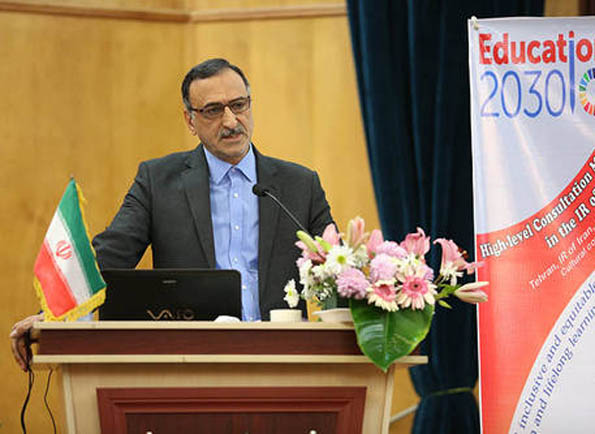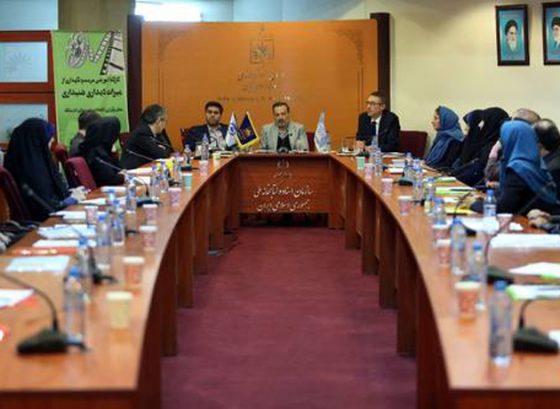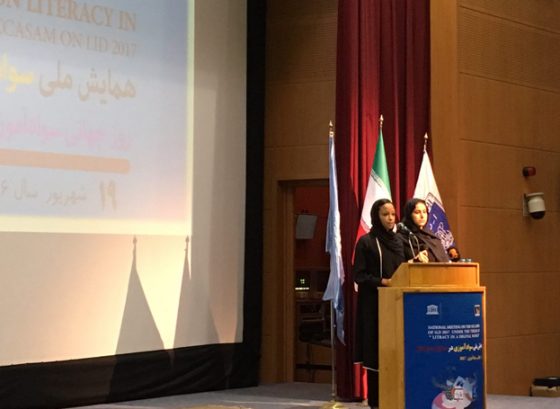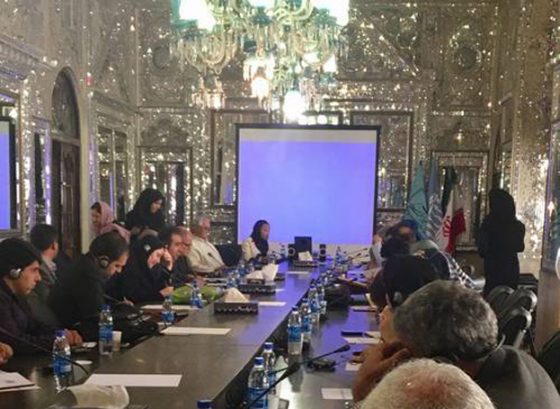UNESCO and UNICEF support High-Level National Consultation Meeting on SDG4

The Ministry of Education of the Islamic Republic of Iran, the UNESCO Tehran Cluster Office, the UNICEF Country Office in Iran and the Iranian National Commission for UNESCO jointly organized a High-Level National Consultation Meeting on Sustainable Development Goal 4 at the Talash Complex in Tehran, AVA Diplomatic reports.
The meeting brought together representatives from various ministries, government agencies and institutions, UN agencies, civil society organizations, research institutes and academia, as well as the private sector.
This high-level meeting was organized to provide an overview of the SDG 4 – Education 2030 agenda to stakeholders, launch the Draft Education 2030 National Document, and to discuss the implementation of SDG 4 (“Ensure inclusive and equitable quality education and promote lifelong learning opportunities for all”) in Iran.
The meeting was formally opened by Dr. Sadollah Nasiri Gheydari, Secretary General, NatCom Iran; Ms. Esther Kuisch-Laroche, Director and Representative, UNESCO Tehran Cluster Office; Ms. Christine Weigand, Deputy Representative, UNICEF Country Office in Iran; Dr. Mohammad Farhadi, Minister of Science, Research and Technology and Chairman of the Iranian National Commission for UNESCO; Dr. Fakhroddin Ahmadi Danesh Ashtiyani, Minister of Education; Dr. Shahindokht Mollaverdi , Vice President for Women and Family Affairs; Dr. Mohammad Amin Sazgarnejad, Deputy Minister of Labour, Cooperatives and Social Welfare and Dr. Iraj Harirchi, Deputy Minister of Health and Medical Education.
In her remarks, Ms. Kuisch Laroche, Director and Representative of UNESCO, highlighted the importance of localizing the global SDG 4 targets through cooperation and partnerships at all levels.
“As we know, translating the SD G4 targets into national priorities is an immense undertaking that requires adapting the global targets to national priorities and the local context and incorporating them into National Development Plans, financing and monitoring processes,” said Ms. Kuisch Laroche. “All stakeholders – government, civil society, academia, the private sector, local communities – will need to be mobilized and engaged to contribute to its implementation. This is why I am very pleased to see so many partners represented here today.”
Ms. Christine Weigand, Deputy Representative of UNICEF, echoed Ms. Kuisch Laroche’s sentiments in her speech and underscored the role of coordination in providing inclusive and equitable quality education for all children. “These groups of children, who are, as we say, ‘out of school’, have been left behind in the global progress towards achieving universal education. Yet these are the children who need our support the most. Helping them access and complete their education requires the collaboration of many different actors. The key to success is the joint and coordinated cooperation of all stakeholders, including different government ministries, academia, civil society and the private sector.”, said Ms. Weigand.
Dr. Farhadi, Minister of Science, Research and Technology and Chairman of the Iranian National Commission for UNESCO, talked about the work that has been undertaken over the past year by several working groups to draft the National Education 2030 document.
Dr. Ahmadi Danesh Ashtiyani, Minister of Education, talked about the progress made in Education since the revolution and the remaining challenges on the road towards the achievement of SDG 4. He thanked UNESCO for its efforts and support to the Islamic Republic of Iran in this regard.
Dr. Amin Sazgarnejad, Deputy Minister of Labour, Cooperatives and Social Welfare, spoke about youth unemployment and the fact that many young people with higher education qualifications do not possess the skills that are relevant for the labour market. He stressed the importance of paying more attention to technical and vocational education and training to address this issue.
Dr. Iraj Harirchi, Deputy Minister of Health and Medical Education, mentioned that non-communicable diseases (such as diabetes, cardiovascular diseases, obesity, high blood pressure) are very much linked to people’s lifestyles and that health education could play an important role in dealing with non-communicable diseases which are responsible for more than 75% of deaths worldwide.
Dr. Mollaverdi, Vice President for Women and Family Affairs, underlined the importance of gender equality and equity in Education and pointed out that scientific research around the world has shown the transformational impact of girls’ education on issues such as health, literacy and sustainable economic development.
The full-day event featured a panel discussion covering topics on national policies, plans and strategies that are relevant to Education and SDG 4, education finance, the implications of SDG 4 on scientific research, and access to education for marginalized and vulnerable communities.
Ms. Maki Hayashikawa, Chief of the Section for Inclusive Quality Education of UNESCO Bangkok and Asia-Pacific Regional Coordinator of SDG 4 – Education 2030 gave a regional overview of SDG 4 implementation in the Asia-Pacific. Ms. Hayashikawa also talked about how UNESCO can support its Member States in the operationalization of the Education 2030 agenda.
Three parallel panel sessions were held in the afternoon to provide specialized task groups a platform to discuss key issues and challenges around Basic and Secondary Education (Targets 4.2, 4.6 and 4.7); Higher, Technical and Vocational, Skills and Entrepreneurship Education (Targets 4.3, 4.4 and 4.7), and; Effective Factors in Implementing SDG 4 (Targets 4.a, 4.b and 4.c). Following the breakout sessions, the panel chairpersons reported back to the plenary and shared the main outcomes of their discussions.
At the closing session, Dr. Ali Allahyar, Head of General Education and TVET Affairs of the Management and Planning Organization, delivered a presentation on the way forward for the national implementation of SDG 4, with a focus on SDG 4 indicators.
To conclude the consultation meeting, Dr. Mohebhosseini of the Iranian National Commission for UNESCO presented the Draft Education 2030 National Document, which consolidates the inputs of 30 thematic working groups convened to develop a roadmap for the national implementation of SDG 4 in the Islamic Republic of Iran.




